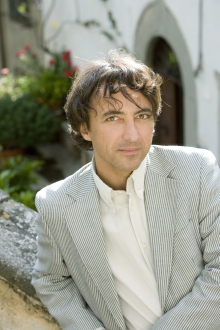|
Symphony
FROM THE NEW WORLD TO THE OLD WORLD
by Peter Lert
Saturday, June 14, 2025
Chamber
MC2 DUO RECITAL CLOSES 222'S SEASON
by Terry McNeill
Saturday, June 14, 2025
Choral and Vocal
CANTIAMO SONOMA'S LUSCIOUS A CAPELLA SINGING IN SEASON ENDING CONCERT
by Pamela Hicks Gailey
Sunday, June 8, 2025
Symphony
SRS SEASON ENDS WITH RESOUNDING TA-TA-TA-BANG
by Terry McNeill
Sunday, June 1, 2025
Symphony
YOUTHFUL VIRTUOSITY ON DISPLAY AT USO'S MAY CONCERTS
by Peter Lert
Saturday, May 17, 2025
Symphony
MYSTICAL PLANETS AND LIVELY GERSHWIN ORTIZ AT FINAL SRS CONCERT
by Peter Lert
Sunday, May 4, 2025
Symphony
VSO'S CONCERT MUSIC OF TIME, MUSIC OF PLACE
by Peter Lert
Sunday, April 27, 2025
VOCAL ELEGANCE AND FIRE AT THE 222'S RECITAL APRIL 26
by Pamela Hicks Gailey
Saturday, April 26, 2025
CANTIAMO SONOMA SINGS AN INSPIRED GOOD FRIDAY MOZART REQUIEM CONCERT
by Pamela Hicks Gailey
Friday, April 18, 2025
DRAMATIC SHOSTAKOVICH SYMPHONY CLOSES PHILHARMONIC'S 25TH SEASON
by Terry McNeill
Sunday, April 13, 2025
|
 |
 Pianist Jean-Efflam Bavouzet |
GALLIC PERFECTION
by Terry McNeill
Friday, November 22, 2013
Jean-Efflam Bavouzet has made French piano music a principal part of his career, but his artistry extends to far more than Gallic masterpieces, as he convincingly demonstrated in a Nov. 22 recital for the SRJC Chamber Concerts series.
Before 180 in Newman Auditorium, Mr. Bavouzet opened with a sparkling reading of Beethovenís "Waldstein" Sonata that featured sprightly tempos and precise articulation. The opening Allegro con Brio was so accurate that it could have been used for score dictation, and nary a nod was made toward romanticized rubato. Only the movement's humor was lacking, something Anton Nel underscored in his "Waldstein" last year in the same hall and series.
The following Adagio and Rondo finale were superbly played, the slow and quasi-introductory Adagio having just the right repose and the Rondo beginning in a dreamy wash of sound, becoming energetic as the music unfolded through the glissando octaves and an accelerated final section.
Ravelís great 1908 "Gaspard de la Nuit" closed the first half. Here, as in the Debussy Preludes to come, Mr. Bavouzet was a peerless interpreter of his countrymanís music. Swirls of sound floated from the piano, and in the big bass sections, usually heavily emphasized, he instead underlined the harmonic beauty of the right-hand chords. The "Le Gibet" movement was played as a dirge over a menacing pedal point, and Mr. Bavouzetís control of register balances was imposing.
In sweeping gestures and diabolerie, the closing "Scarbo" movement was a tour de force of terrific pianism, replete with sharp bass sforzandos, swift repeated notes and concentrated drama. A standing ovation ensued.
Debussyís first seven Preludes (of 12) from his Book I followed intermission, each receiving playing of a unifying mood and character. Here the pianistís consummate control or tone color and delicate phrase was on full display. Especially memorable were the imaginative tonal balances in "Les sons et les parfums tournent dans líair du soir" and the lively and rhythmically playful "Les collines díAnacapri." It was subtle and authoritative Debussy, lovingly presented.
There is no easy way to move from the pellucid impressionism of the Debussy Preludes to the Bartok Piano Sonata, so Mr. Bavouzet simply dove headlong into the Hungarian's three-movement virtuoso work from 1926. The composerís longest solo piece for piano, the Sonata is tonal but dissonant throughout. The complicated embellishments and rhythms posed no problems for the pianistís technique, and his careful pedaling (including sections when the damper pedal was not used) brought out snippets of folk tunes heretofore new to me. In the Allegro finale an effective toccata-like pace was adopted and gave a potent character to the trenchant neo-classical music.
If there was to be an encore, something sedate was called for, and Mr. Bavouzet responded to the applause with another delicate Debussy Prelude, "La fille aux cheveux de lin." He played it with sensitive legato, a wonderful ending to a provocative and nearly faultless recital.
|
